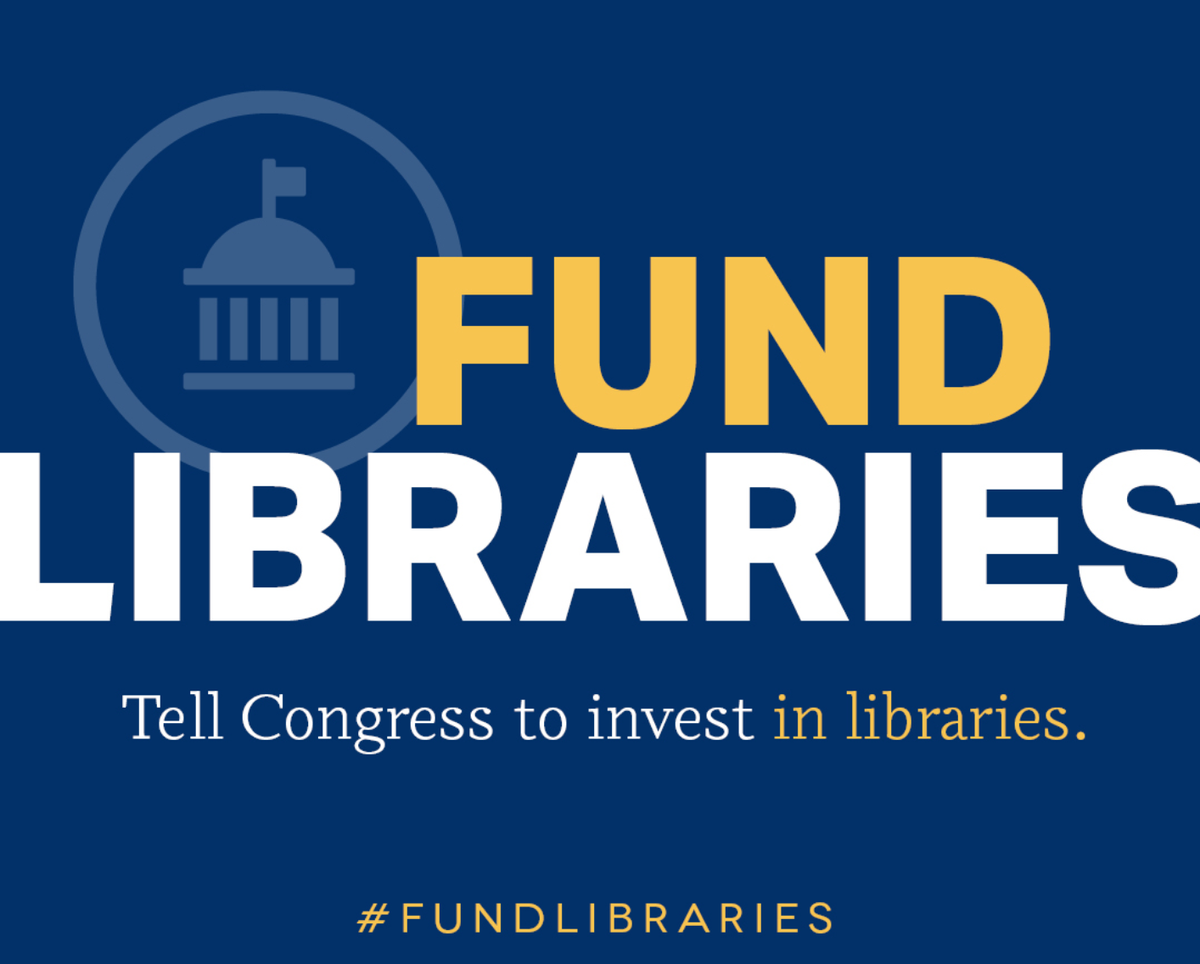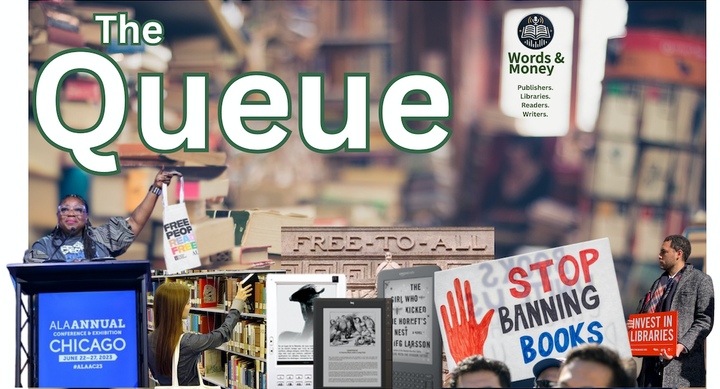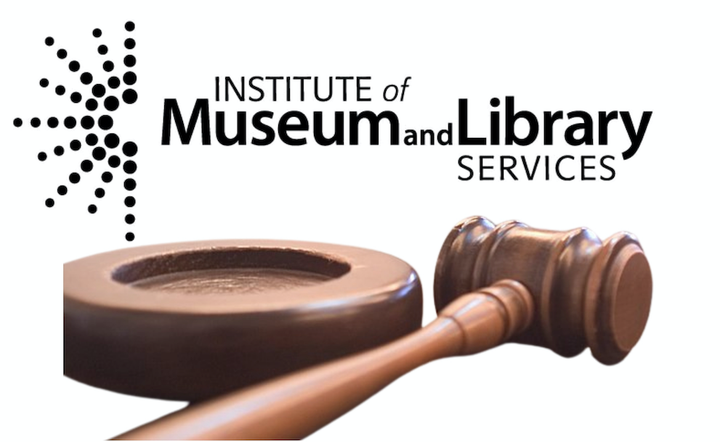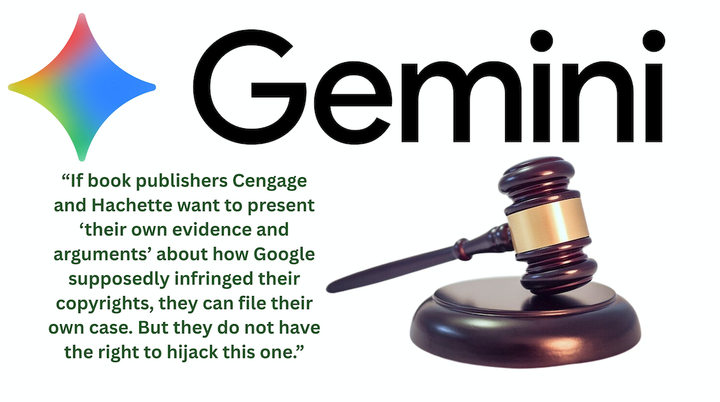The Queue: Library News for the Week Ending April 18
Among the week's headlines: while fighting in court to save IMLS, ALA is also rallying library advocates to push Congress for FY 2026 funding; a Michigan court rules against book bans; the library world mourns Cliff Lynch; and the second IndeLib Forum takes place in New York.

Even as its lawyers are in court seeking to block the Trump Administration’s efforts to end all federal library funding, the American Library Association this week began its annual “Dear Appropriator” campaign to advocate for library funding in the FY2026 federal budget. “Dear Appropriator” letters are an important tool in the budget process, and getting legislators to sign on to the letters remains an important marker of support for libraries. The letters close in just a few weeks, so ALA officials are asking for immediate action.
“We need your support: Urge your U.S. Representatives to sign ‘Dear Appropriator’ letters in support of federal library funding requests,” the campaign notes, providing a link for advocates to do so: Take action: Contact your House Reps to #FundLibraries.
In Trump’s first term, the administration proposed to permanently eliminate IMLS and with it virtually all federal library funding in each of its four budget proposals. However, lawmakers rejected those attempts on a bipartisan basis, with library advocates instead winning budget increases for IMLS in each of Trump’s first four years in office, increasing the agency's funding by some $26 million over Trump’s first term.
Of course, this is not a normal year, the letter acknowledges.
“As the courts deliberate on the Administration’s illegal attempt to eliminate the only federal agency dedicated to libraries, the Institute of Museum and Library Services (IMLS), it’s critical that Congress includes funding for this agency through the Library Services and Technology Act (LSTA) in the FY2026 budget—otherwise, IMLS won’t be able to operate, regardless of the outcome of the court cases. For school libraries, Innovative Approaches to Literacy (IAL) provides needed resources for addressing literacy. Similarly, while courts debate the future of the Department of Education, it’s vital that Congress continue funding for IAL.”
This year's "Dear Appropriator" letter calls on Congress to provide "robust funding for the Library Services and Technology Act (LSTA) in the Institute for Museum and Library Services," and asks for $50 million for IAL.
While the Trump Administration's FY2026 Budget proposal is not expected until mid-May, the expectation is that it will provide only enough funding for a winding down of the IMLS. Indeed, a leaked draft of the administration's budget proposal suggests the administration is preparing to seek massive cuts to virtually every federal agency.
Making Headlines...

The Coalition for Networked Information this week released a heartfelt tribute to Clifford Lynch, the organization's visionary leader, who died last week just weeks before his scheduled June 2025 retirement. "Known for his kindness, warmth, and humble disposition, Lynch was highly skilled at fostering connections across organizations, sectors, and professions," the statement notes. "Lynch’s tireless commitment and visionary leadership will have an enduring impact and will continue to inspire future generations. Our thoughts are with his wife Cecilia Preston and his loved ones; he will be greatly missed." At Lynch's request, the statement adds, there are no plans for a public memorial service at this time. "It was Lynch’s wish that memorial tributes and expressions of sympathy be made in the form of support for library technology, archiving, or preservation projects, such as the Internet Archive, EveryLibrary, or other similar organizations."
In North Dakota, InForum reports that Senate Bill 2307, a bill requiring the removal of sexual content from public and school libraries in the state, is heading to governor Kelly Armstrong's desk. “The bill narrowly passed the North Dakota House on Monday, April 14 and would require schools and public libraries to keep what it calls ‘offensively sexual’ materials inaccessible to children. It would also allow any person to file a formal complaint asking a library to review material they find offensive.” Notably, it’s not clear what “offensively sexual” means. Also concerning, the law would expose librarians to prosecution for violating the law.
In North Carolina, NC Newsline reports that The North Carolina House Education Committee has passed House Bill 636, which would also ban books with sexual content from school libraries and which would also expose school officials who do not comply to legal jeopardy. “The bill declares any media containing ‘descriptions or visual depictions of sexual activity’ to be inappropriate for all ages and grade levels,” the report states. “Rep. Laura Budd (D-Mecklenburg) said that despite the lawmakers’ assertion that the bill seeks to protect parental rights, it instead infringes upon them by allowing other parents to block her children’s reading material.”
In Indiana, local affiliate WSBT reports that public libraries are bracing for impact after Senate Bill 1 was signed by Governor Mike Braun, which will reform property taxes in the state. "Many public services such as libraries say they stand to lose a significant chunk of their funding as the bill goes into effect," the report notes. "Daniel Lichty with the St. Joseph County Public Library says they anticipate losing around 10% of their total revenue each year."
In Michigan, MLive reports that the Michigan Court of Appeals has dismissed a lawsuit that sought to ban 14 "sexually explicit” books from a West Michigan school district’s library. "Plaintiffs claimed the books in question were 'sexually explicit' and 'pornographic,' alleging Rockford administrators committed a felony by disseminating the books to minors," the article notes. "In an October 2023 ruling, Kent County Judge George J. Quist said while he agreed with plaintiff concerns about the sexually explicit nature of some of the texts and illustrations in the books, they do not qualify as being 'harmful to minors' because the books as a whole have literary value."
The American Civil Liberties Union of Tennessee, along with attorney Kerry Knox on behalf of three Rutherford County families and PEN America have filed a lawsuit against the Rutherford County, Tennesee Board of Education, in response to the banning and restriction of more than 145 books from school libraries in the county. “The Rutherford County school board began banning materials in the spring of 2024 through informal requests by school board members, initially without any public meeting or vote of the board,” a statement from PEN America reads. “The plaintiffs are asking the court to block Rutherford County from continuing to ban books from school libraries, and to reinstate many of the materials that have already been banned or restricted.”
The New York Times has a report on another ACLU lawsuit, this one against the U.S. Department of Defense’s education agency over the removal of diverse books from a school system for children of military families run by the Defense Department. The lawsuit, filed in federal court in the Eastern District of Virginia, centers on "a number of changes under the Trump administration, including the pausing of student affinity clubs focused on race and gender and the removal of Pride decorations at some schools," the report states. "Because Defense Department schools are run by the federal government, they have been uniquely subject to President Trump’s executive orders on education, such as an order ‘ending radical indoctrination in K-12 schooling’ that criticized teaching about concepts like white privilege and rejected policies supporting transgender students’ preferred pronouns and bathrooms, for example."
In Delaware, WDEL reports that lawmakers have introduced a new bill “designed to curtail book-banning in Delaware libraries.” As in other states, the proposal, House Bill 119, is known as the Freedom to Read Act, and would “prohibit removal of materials based on an author's background, or for partisan, ideological or religious objections.”
The Berkshire Eagle reports that anti-book banning legislation in back in Massachusetts, too. "Proposed legislation aimed at ensuring public and school libraries can offer diverse and inclusive books and media without political interference is back before committee, after advancing favorably last session," the article states. "An act regarding free expression, filed by state Sen. Julian Cyr and state Rep. John Moran, requires decisions on what materials are appropriate for school and public libraries to be selected based on professional training rather than political or personal views."
The Guardian this week reports that right wing U.S. style book banning campaigns may be taking root in the U.K., too. "Trump’s presidency has injected new energy into the book-banning movement that has been simmering for years on the US right. You might think that censoring school libraries would be totally unimaginable in Britain." writes librarian Alison Hicks. "You’d be wrong."
In Alabama, AL.com reports that morale among librarians is taking a hit amid recent political attacks, which includes a pending bill, HB 4 that would criminally threaten librarians for suggesting 'inappropriate' books for children. "At a two-hour 'Libraries Under Fire' session, librarians discussed how they’ve managed being scrutinized by conservative groups and politicians for supposed 'sexually explicit' content in books," the article notes. "Lacie Sutherland described working at Autauga-Prattville Library, the initial epicenter of statewide book controversies. Sutherland, along with several other employees, was dismissed in 2024 after protesting the firing of director Andrew Foster. She recalled spending weeks reading a 500-page book that was challenged as 'sexually explicit' by a patron. The content gave few details and the explicit passage was several sentences long "'There’s one paragraph where it’s a closed-door scene,' Sutherland said. 'The two main characters are implied to have sex. And that was the whole thing.'"
And finally this week...

On April 16, more than 100 indie publishers, librarians, and other collaborators gathered for the second annual IndieLib Forum, an intimate conference that seeks to foster better communication between librarians, indie publishers, and other collaborators. Hosted by the Independent Publishers Caucus and the Digital Public Library of America (DPLA) the conference launched to strong reviews last year ahead of the 2024 Public Library Association meeting in Columbus, Ohio.
Much like our mission here at Words & Money, O’Brien said the goal of the IndieLib forum is to “foreground conversation and education” between indie publishers and librarians and to highlight their shared missions and goals. And for a second straight year, the forum delivered. Held at New York University, the program included a fast pitch “Book Buzz” breakfast, a opening panel looking at the library/publisher landscape, a panel on the marketing potential for libraries, and a panel exploring how libraries quantify their success in reaching readers. This year’s program also featured ample time for networking.
Amid surging censorship, ongoing disputes over digital content, and the unsettling political attacks on libraries and the free press, getting publishers and libraries together in a room this year felt especially important. Meanwhile, organizers said plans are in the works for a third IndieLib Forum—this one to be held ahead of the 2026 Public Library Association conference, which is set to take place in Minneapolis, from April 1-3. Mark your calendars: given the current state of affairs, it’s never too early to start planning ahead.
And look for a full report on this year's IndieLib Forum in our first newsletter—which we are planning to deliver next week, on Friday, April 25.


